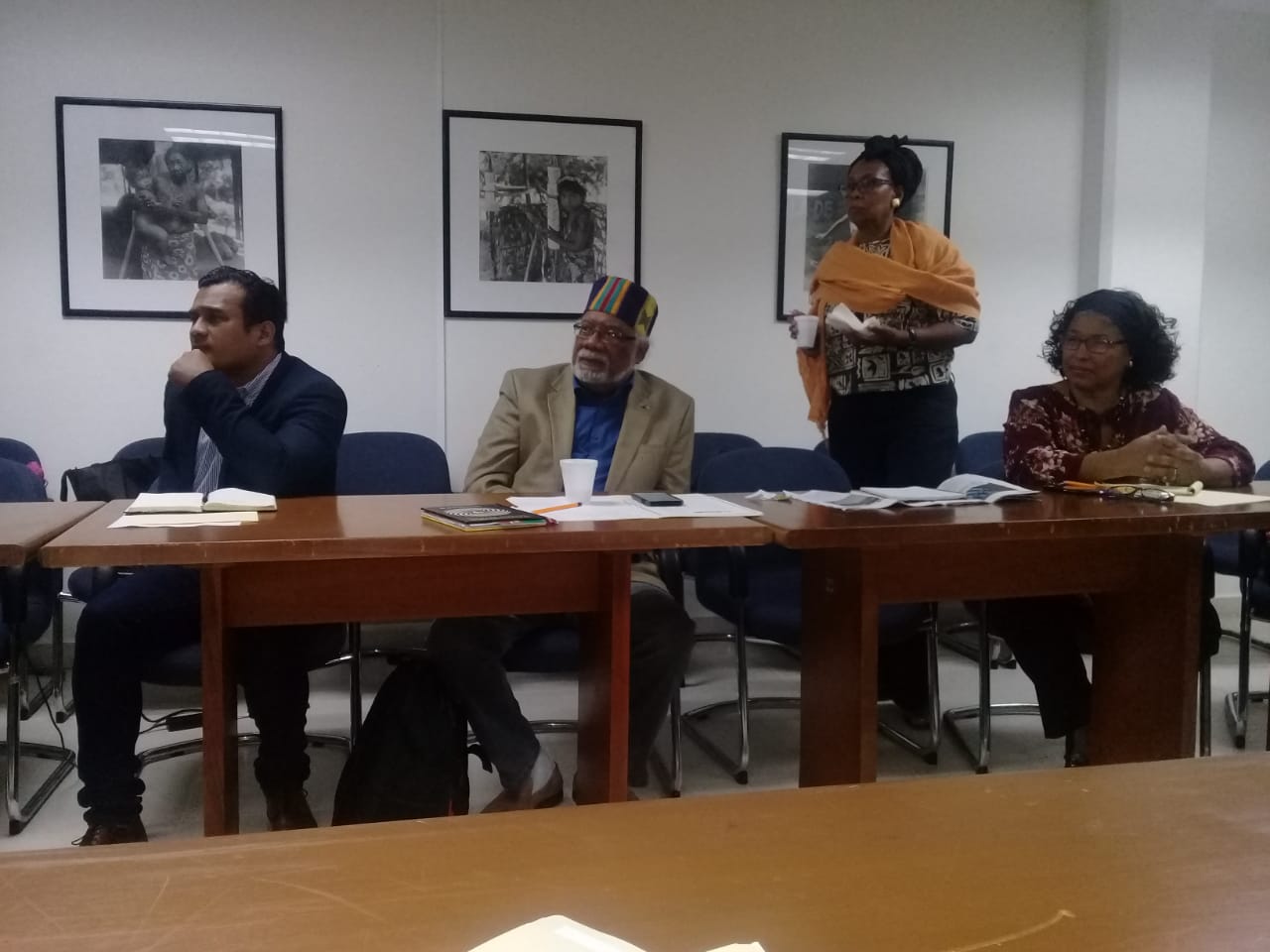ECLAC monitors the 2020 Panama Census process and the participation of its Afro-descendant population
Washington, D.C. August 25, 2018. The Institute on Race, Equality and Human Rights (Race and Equality), together with the National Secretariat for Afro-Panamanian Development (SENADAP), arranged for the participation of […]

Washington, D.C. August 25, 2018. The Institute on Race, Equality and Human Rights (Race and Equality), together with the National Secretariat for Afro-Panamanian Development (SENADAP), arranged for the participation of Fabiana Del Popolo, Demography Coordinator at the Economic Commission for Latin America and the Caribbean’s (ECLAC) Latin American and Caribbean Demographic Centre (CELADE), in a meeting of the Afro-Descendant Technical Group. The meeting was designed to provide support to and empower members of the Afro-Descendant Technical Group.
A working table meeting held on August 22, 2018 at the United Nations Development Programme (UNDP) office in City of Knowledge, Clayton, Panama, was convened by SENADAP Director Urenna Best. The meeting also included the participation of Joyce Morris of the National Institute for Statistics and Census’ (INEC) Population and Housing Section, and Elvia Duque, Program Officer for Race and Equality. During the meeting, Fabiana Del Popolo stressed the fact that Latin America is the region with the highest levels of ethnic/racial inequality in the world and that Afro-descendants are the most vulnerable ethnic/racial group. Additionally, she described historical statistics of Afro-descendants in the region, the role of the various international treaties, and the advocacy work done by Afro-descendant activists to increase the amount of disaggregated data statistics available by race/ethnicity. She also urged those present to closely monitor the State’s level of accountability to its Afro-descendant population, specifically in relation to the goals/standards of the UN Decade for People of African Descent, CEPAL’s “Montevideo Consensus on Population and Development” (2013), and the UN Sustainable Development Goals (2030). She also presented a disaggregated comparative analysis of the different methodologies and post-census results on Afro-descendant and indigenous populations in Latin America.
Members of the Afro-descendant Technical Group were very interested in Ms. Del Popolo’s analysis, which described other census processes such as those in Costa Rica, Colombia, Brazil, and Venezuela as successful examples to follow. However, she stressed that “there is no perfect question,” referring to the drafting of a self-identification question for Afro-descendants. She explained that the context of these countries is different than that of Panama, but that they present similar challenges that have been overcome thanks to the empowerment of and increase in participation of civil society during the entire census process, as well as the technical support from data experts.
Ms. Del Popolo explained that experiences such as the 2010 Census in Panama must be observed and analyzed as a whole. The analysis should not just yield information on the population percentages but must also produce information on the inequality gaps reflected in these figures. This information will form the basis for advocacy tools that can be used to demand public policies in favor of the Afro-descendant population. In this respect, she noted that “we must be clear in what we are trying to measure with a census – whether it’s diversity or inequality of a populational group in particular, or other aspects.”
Similarly, the expert stressed the need to learn from other experiences, such as those of indigenous Colombians and the Afro-Peruvian population who, despite being minority groups, have generated strategies that have improved the position of their communities.
Ms. Joyce Morris of INEC presented an analysis of the background of the ethnic/racial self-identification question in Panama. She also presented, for the first time, an outline of the question and concepts that were to be included in the home surveys of August 26, 2018, which included changes requested by the Technical Group.
The session was concluded by highlighting the advances made in the 2020 Census in Panama, which features the elimination of filter questions that lead to the Afro-descendant self-identification question. She also stressed the need for the Afro-descendant Technical Group to receive proper permanent technical support. Race and Equality wishes to continue to contribute sustainable strategies to support the 2020 pre-census, census, and post-census processes.
Ms. Del Popolo also participated as a featured panelist at Casa Amarilla, a Presidential complex where, in front of Afro-Panamanian activists, she spoke about prior census experiences from Latin America which included the ethnic/racial self-identification question. She highlighted the importance of having an Afro-Panamanian Technical Group as the first step in aligning the goals of the Afro-Panamanian population with the INEC and other key entities of the 2020 census process. In her presentation, she also urged the public to find out more about the Technical Group and to support its work.
Elvia Duque stressed Race and Equality’s commitment to coordinate with SENADAP and support the Afro-descendant Technical Working Group during its interactions with the INEC and other government institutions. She also highlighted the need to create a roadmap that will allow them to focus on the goals and steps to follow. She stressed the Technical Working Group’s commitment to thoroughly examining the results of the 2010 Census and the subsequent household surveys in order to ensure that the 2020 Census reflects the reality of the Afro-Panamanian population.

